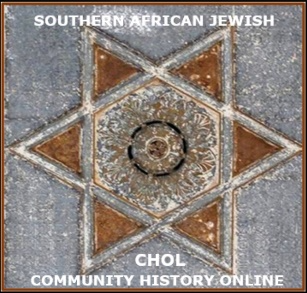click to dowload our latest edition
CLICK HERE TO SUBSCRIBE TO OUR NEWSLETTER


Published
1 month agoon
By
Lee TankleWhat started off as a plan to create an online platform for the Jews of Kimberley has, with the help of South Africans around the world, become a platform to preserve the footprint of South African Jewish communities in general.
It all started 10 years ago, when Geraldine Auerbach, a Kimberley native living in London, was inspired to create a platform via a newsletter for other Jewish people from Kimberley to connect. She had seen a website created by Dave Bloom, who lives in Israel, for Jewish people from Zimbabwe.
“It seemed like a wonderful thing to put together family stories, pictures, cemetery records, and synagogues,” Auerbach said. “I wanted to do the same thing for Kimberley, and maybe other communities as well.”
Auerbach realised her dream in 2020, when she brought the Community History Online (CHOL) website to life with the help of Eli Rabinowitz, an ex-South African living in Perth, who created the Kehilalinks websites for communities in Eastern Europe and South Africa; together with Professor Adam Mendelsohn, the director of the Kaplan Centre for Jewish Studies at the University of Cape Town; Gavin Morris, the director of the South African Jewish Museum in Cape Town; and their archivists, Katie Garrun and Leila Bloch.
Professor Abraham (Bramie) Lenhoff, the webmaster of CHOL, originally from Upington and who now lives in Delaware in the United States, spent a lot of time compiling the names and tombstones of Jewish people in cemeteries in smaller Jewish communities like his own in Upington.
Lenhoff got in touch with Auerbach to see if the work that both had done to preserve their communities could have a platform for others to see.
In 2020, Gail Loon Lustig, a retired medical doctor originally from Bellville, Cape Town, was already involved with the Kaplan Centre as the centre had showcased Lustig’s web exhibition of the families of doctors and pharmacists from Bellville.
“After my dad died in 2011, I decided that we had to pay tribute to these Jewish doctors who had done amazing work in the northern suburbs. They established family medical practices and primary care in that area unconditionally to blacks, whites, whoever needed it, with lots of compassion and expertise. I wrote to the children of these various doctors. There are 20 doctors, and their children are all over the world,” Lustig said.
Lustig was approached by Auerbach after Auerbach saw the web exhibition, suggesting that Lustig join the team to work out a way to let people submit stories to add to the array of content on the site.
“I love writing and throughout the years, I’ve written stories and shared them with family and friends. I thought it would be lovely if we had a website which we could somehow make a forum for people all over the world to enjoy. The genre of the writing could be anything – creative non-fiction, fiction, poetry, or memoirs,” Lustig said. Lustig would then compile an array of stories from authors who would send in their stories or she would find the stories herself online. These would then be shared on the site, and the authors could join a Zoom session every three months and share them.
“One day, I found a story on the internet titled Mrs Marcus’s Bagels. It attracted me. It was written by Raphael Shevelev, who came from Cape Town. He wrote about Mrs Marcus’s Bagels, which he adored. I found an email address, and told him, ‘I’m running this site, and it would be lovely if you’d like to publish it on the site.’ He never replied. But then, about three months later, I got a reply from his wife who, after Shevelev passed away, had randomly checked his emails and saw my message. She said, ‘It’s amazing! Did you know Raphael?’ I didn’t, but I loved his story. She’s joined our group, and she reads his stories, of which there are many. She’s never been to South Africa, but she loves our group of South Africans because we remind her of him,” Lustig said.
There are 48 communities listed on the CHOL website, ranging from smaller communities like Beaufort West, De Aar, Port Elizabeth, Graaff Reinet, Mauritius, and Potchefstroom, to larger communities like Johannesburg and Cape Town.
“Some communities are well developed, some are less so, some just have a lot of material, but they’re all working towards making a web presence for the community,” Auerbach said.
“This is different from a book or anything like that because you can always add to it. We thought we could have a page for communities, a page for our stories, and then we found that some stories are more like memoirs, so we thought, well okay, let’s just have a memoirs page, and then we thought we could add some resources so that if people wanted to know where to look up articles or databases, they could find it there, so the website became a one-stop shop where we don’t own everything, but we lead you to everything.”
Although CHOL is intended mainly for Jewish South Africans, Auerbach and Lustig say the forum is open to any South African or anyone interested in these communities.
Please visit: www.chol.website

Pam mccullough
Mar 16, 2024 at 4:18 am
So interesting…I am not Jewish but love the Jewish history and people